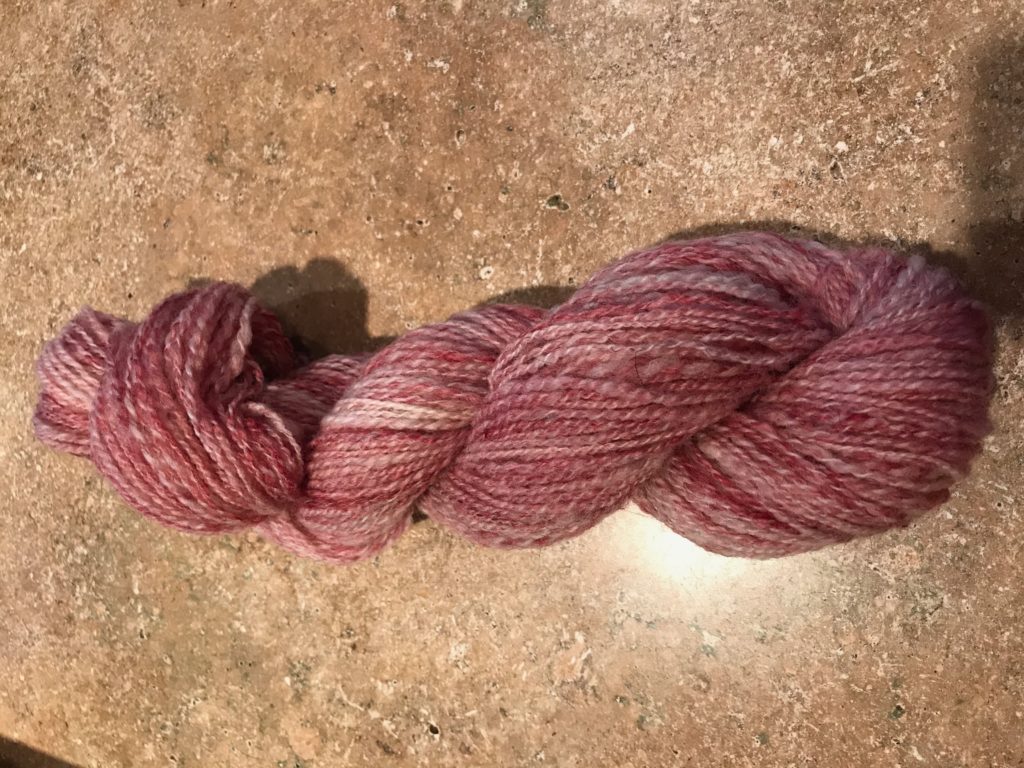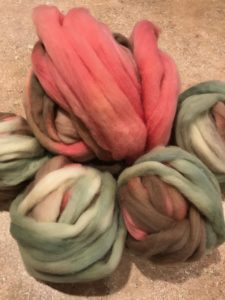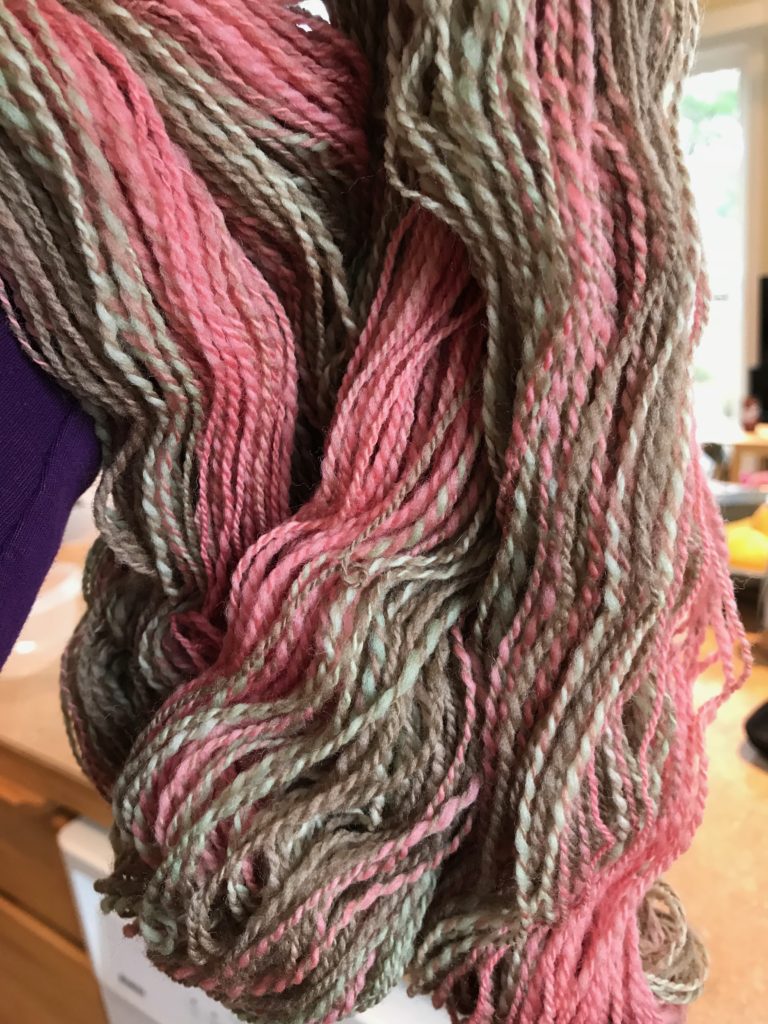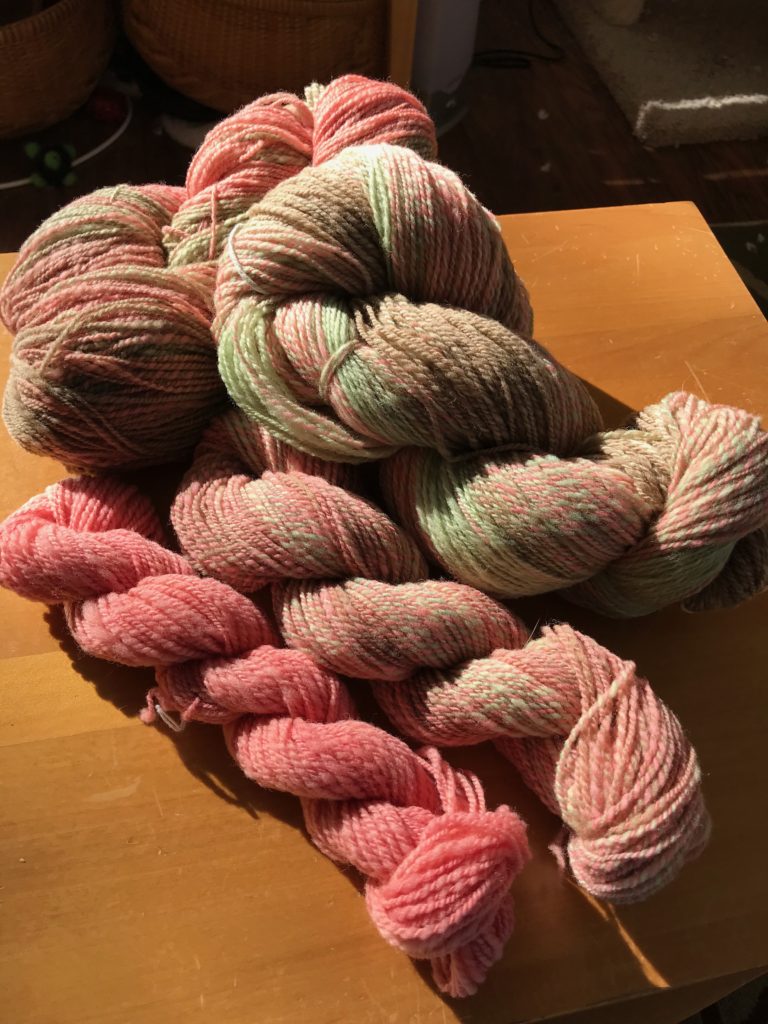What I’ve Been Spinning
You may recall that in my last post I had spun a lovely melange of BFL, picked Gotland locks, and bamboo into a single but then wasn’t quite sure what I wanted to do with it. I only had a little bit of the locks and I had used them all, so replicating it exactly wasn’t possible. Instead, I decided to create more rolags with just the BFL and bamboo, spin them up, and ply it with the single containing the Gotland. I am very happy with the result!

There wasn’t enough Gotland in the first single to make it markedly different from the second, so all works well together. I have a little more BFL left, so I think I’ll just make more of the bamboo blend with it. It will be interesting to see if there is a noticeable difference if neither ply has Gotland in it.

I have also been working on spinning an 8 oz. braid of Targhee from Willamette Valley Wool Company that I picked up last summer at Black Sheep Gathering. I’m a new enough spinner that 8 oz. feels like a LOT of fiber. Particularly when it’s only three colors. There is nothing wrong with only three colors, but with runs that long you have to really like looking at them. In any case, I started this spin in January, and just finished it at the beginning of March.
I chose to do a fractal spin with this yarn – I split the yarn in half, and then split one of those halves into 5 strips. I spun the big half from pink end to green end, and the smaller strips end to end in the other direction, always starting with the green. At some point during my spin I realized that the brown in the middle was the pink and the green mixed together, and it became interesting to look for the places that were more pink or more green.

I made a two-ply and finished it by soaking in hot water and snapping. From the photo above you can see that it’s slightly over-plyed – I usually ply that way. All that wigglyness blocked right out, and it hung straight when it was dry.

You can see that it is going to stripe, which I guess I knew was going to happen – I just didn’t consider how much.. The little pink skein is the end of one bobbin that I plyed on itself, but there are equivalent amounts of green and brown that are not mixed with another color. When I choose a project, I’ll have to decide whether I want to keep the stripes or do something to break them up.
I learned a lot about what a tri-color braid would do during this spin. I’m about equally a “plan before you do” and “try it and see what happens” person, and this was definitely a try it situation. I have another tri-color braid in my stash, and I’m already thinking about how I might break it apart differently to diminish the single-color stripes.
The Dreaded Math
The other thing I finally tackled at the end of this spin was measuring my yardage after blocking. I was taught to measure it as I wound it off of the bobbin using my niddy noddy – which only kind of works for a number of reasons. I am terrible about pulling the yarn tight around the niddy noddy, so it springs back when I take it off. I also tend to get little curly-cues that block out. And then I saw this:

Those are the two fibers I have talked about above. I wound both off the bobbin onto the niddy noddy and counted the yards – my niddy noddy is two yards. I blocked them exactly the same way – soaked in hot water and snapped before hanging with no weight. You can see that the Targhee has sprung up a lot more than the BFL blend.
I did a little research online about how others measure their yardage. While I aspire to own a yardage counter that you can run with a swift, I don’t have one yet. I also don’t have a McMorran yarn balance, and although I’m sure I could set one up I don’t have a calculating Excel spreadsheet. Lacking any of these I could only employ one strategy…MATH.
I found this post about figuring skein length in metric, and extrapolated that for yards. The principle is the same, though.
First I laid my skein out flat on the counter and measured one half of it in inches. It would also work to lay the tape measure in the center of the skein and measure from one end to the other. I doubled that number (so, if half is 30 inches then the total is 60 inches) multiplied by the number of strands in the skein. Then divide that number by 36 (for the number of inches in a yard) and voila! Your finished yardage.
As an example, half of one of my Targhee skeins measured 27 inches. Twice that is 54 inches. There were 218 strands in the skein. 54 x 218=11,772. Divide by 36 – 11,772/36=327 yards.
I still think of it as a slightly wiggly number, but it is more correct than the pre-blocked one! If you’re interested in calculating the “loss” in yardage between the pre-blocked length and the blocked length, simply divide your pre-blocked yardage into your blocked yardage and subtract from 100, and it will give you a percentage of loss.
Using my example above, the original number of yards I wound off the bobbin and onto my niddy noddy was 436. Post-blocking, I have 327 yards. 327/436=.75 and 100-.75=.25. In this case, with this skein, I had about 25% “loss” in my yardage. This is partly because I may have wound too tightly, but it’s also because the yarn relaxed out and puffed up during its warm bath. Obviously the Targhee puffed more than the BFL!
For more on the changes in yardage after blocking, or setting the twist, check out April’s post on With Wool.
I think that about does it for this post – next time a little about sampling Finnsheep, and perhaps adventures with spinning from a batt.
